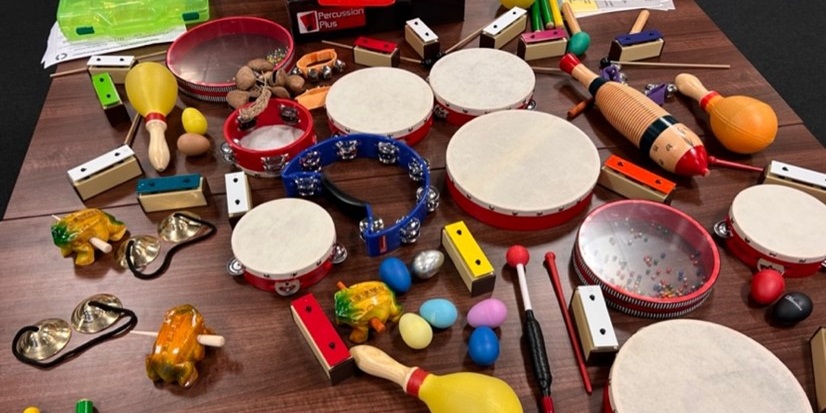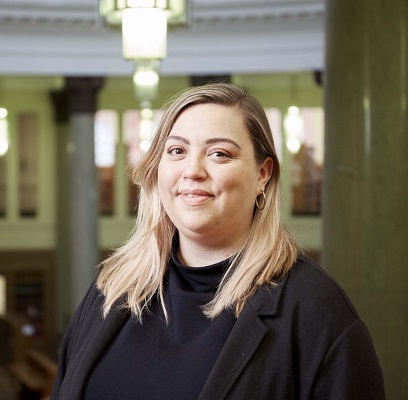)
Exploring the benefits of music in care homes
On 23 November 2023 researchers from the NIHR SSCR-funded project “The impact of an improvised music-making training programme on care home staff: a process evaluation” hosted a Research Café with Creative Manchester, Manchester Camerata and Health Inequalities at the University of Manchester, to explore how musical training can support the wellbeing and practice of care staff and care home residents. Here Dr Robyn Dowlen, Dr Henry McPherson and Professor John Keady, from the research team at University of Manchester, reflect on the event.
What is Music in Mind?
Music in Mind is Manchester Camerata’s flagship music programme for people living with dementia, their family carers, and people supporting them in a professional capacity, such as care home staff and community practitioners. As NIHR SSCR researchers, we have informed the development of the programme in a critical dialogue with Manchester Camerata.
Music in Mind is underpinned by the values and principles of live, improvisation-based music making (i.e., spontaneous creation of rhythmic, melodic, and harmonic material) and includes people at all stages of dementia and/or who are experiencing self-reported memory problems. Each session is co-facilitated by a music therapist and an orchestral musician from Manchester Camerata who has been specially trained in working alongside and with people living with dementia. The values of co-facilitation and co-creation are at the heart of Music in Mind, meaning that music-making is centred on ‘in the moment’ creativity, improvisation, inclusivity and collaborative participation. To date, Music in Mind has engaged 11,000 people living with dementia, their family carers and care staff/supporters across Greater Manchester and the North West of England.
In recent years, Manchester Camerata have been working closely with staff carers from care homes to build their confidence in using music with their residents to complement the live Music in Mind programme. Alongside 20 Music in Mind sessions, care staff receive training from the Music in Mind musicians and music therapists across 10 sessions. Project researchers in the NIHR SSCR-funded study have been conducting a process evaluation of the training programme to understand the mechanisms underpinning the programme and explore how the training impacts care staff’s sense of confidence and wellbeing. The study is also supported by experts by experience, ‘Open Doors’ – an advocacy group of people living with dementia and their family caregivers, who have supported the direction of the project and dissemination of outputs.
Research café: Making music together
“During the event, I got a glimpse of how making music together can be a powerful tool for communication and therapy. It is also clear that collaborative creative experiences throw up many avenues for health-related research” – Professor Dame Nicky Cullum, Director of the NIHR Applied Research Collaboration for Greater Manchester
Attendees at the Research Café had the opportunity to experience a Music in Mind session for themselves before a Q&A session with researchers and musicians. The purpose of the event was to facilitate embodied, sensory and relational experiences through spontaneous musical interactions for attendees. These were then used as a springboard for discussion about the role of music in the lives of people living with dementia, the significance of collaborative research and the methods that can be used to capture these ‘in the moment’ experiences. The Research Café was attended by 27 interested participants from an array of disciplines, (i.e., health, music, theatre, psychology), students with an interest in creative approaches to health and health practitioners.
On arrival, Research Café attendees were invited to take part in a Music in Mind session. They were encouraged to join the music-making circle with an array of percussion instruments available to them to explore. There were very few verbal instructions given to the attendees, but they were handed instruments or encouraged to help themselves to instruments on the central table (pictured above). The Music in Mind musicians began the session with a ‘Welcome Song’, naming each member of the group through song. Twenty minutes of improvised group music-making was then supported by the musicians, who encouraged participation through skilled facilitation.
Finding meaning through ‘moments’
The group music-making was followed by a reflection section and Q&A with the researchers and Manchester Camerata musicians. Attendees expressed their enjoyment of the music making, with one attendee stating that it had allowed her to completely focus on ‘the moment’ and to forget anything extraneous to the session. Another highlighted how joyous the experience had been and reflected on role of laughter and playfulness in creating moments of connection between the group and the musicians. The experience created an awareness of how beneficial this musical approach can be for creating meaningful moments of connection for people living with dementia. The experience helped attendees to see the value of musical programmes for people living with dementia, as this attendee quote highlights:
“Being able to attend the Research Café session on “Music in Mind” has really brought this amazing work to life for me and has highlighted Manchester Camerata’s impact on the health and wellbeing of the people they visit. One attendee at the session described as “magical” what they do for people living with dementia with this outreach activity in the community” – Denise Davidson (Research Impact Officer, Faculty of Biology, Medicine and Health, University of Manchester)
Overall, the Research Café enabled a reflective and critical discussion of the role and value of music in the lives of people living with dementia. As a research team we are excited about the ongoing collaboration with Manchester Camerata to explore the potential of Music in Mind as a creative, musical opportunity for people living with dementia, family carers and care staff supporting them in a professional capacity.
Read more about Music in Mind and this SSCR research study on the project page.
Read NIHR Social Care Speciality posts here →






